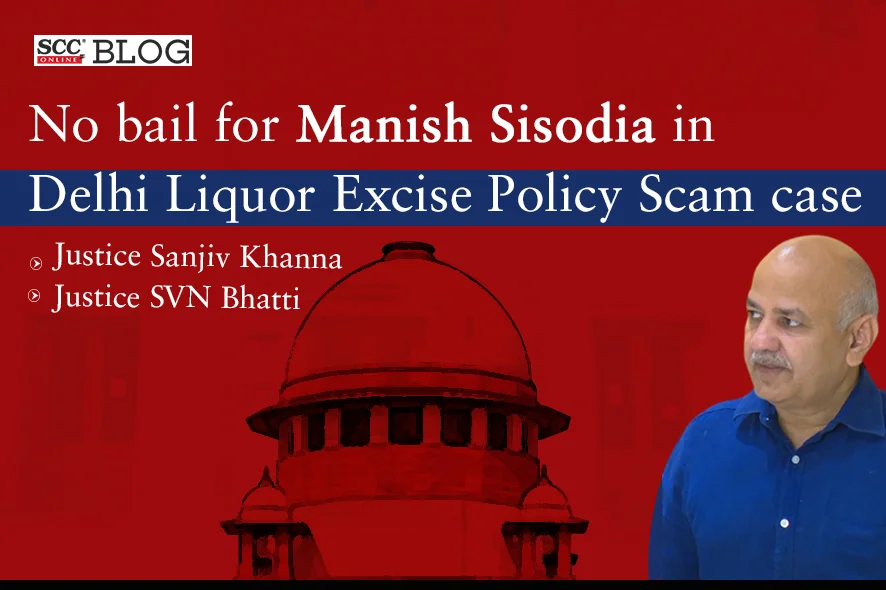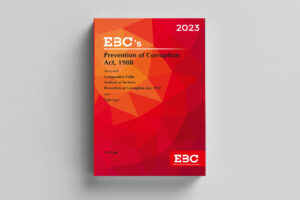Supreme Court: In a criminal appeal filed by Aam Aadmi Party (‘AAP’) leader Manish Sisodia, seeking bail in a case registered by the Central Bureau of Investigation (‘CBI’) under Prevention of Corruption Act, 1988 (‘PC Act’) and Penal Code, 1860 (‘IPC’), and Directorate of Enforcement (‘ED’) under the Prevention of Money Laundering Act, 2002 (‘PMLA Act’), the Division Bench of Sanjiv Khanna* and SVN Bhatti, JJ. refused to grant bail to Manish Sisodia profit margin of wholesale distributors of liquor comparing 5% commission under old and 12% under the new regime.
Manish Sisodia is facing trial for offences under Sections 7, 7A, 8 and 12 of the PC Act, Sections 120-B, 201 and 420 of the IPC and Sections 3 and 4 of the PMLA Act.
Manish Sisodia Bail History
The Rouse Avenue District Court had refused to grant bail to Manish Sisodia vide order dated 31-03-2023, while the Delhi High Court on 3-07-2023 had also rejected Sisodia’s bail application in Delhi Liquor Excise Policy Scam case. The said bail application was brought before the Supreme Court which was disposed of through the instant order.
Background
Sisodia was arrested on 26-2-2023 and the investigation is still ongoing pertaining to allegations of manipulation of formulation and implementation of excise policy of Government of National Capital Territory of Delhi for facilitating monopolization and cartelization of liquor trade in Delhi. Allegedly, certain provisions were inserted in the existing excise policy to favour the lobby and other members of cartel in liquor business in furtherance of a criminal conspiracy between several accused persons.
Supreme Court on Rule of Law
“Rule of law means that laws apply equally to all citizens and institutions, including the State. Rule of law requires an equal right to access to justice for the marginalized. The rule also mandates objective and fair treatment to all. Thirdly, rule of law is a check on arbitrary use of powers. It secures legitimate exercise of power for public good.”
Court’s consideration in Manish Sisodia case
The Court refrained from delving into any of the various legal issues and questions raised for consideration. However, the Court went on to frame the following questions for grant of bail to Manish Sisodia:
-
What is the scope and ambit of constitutional protection under Articles 74 and 163 of the Constitution of India on decisions of Council of Ministers?
-
Whether on interpretation of Section 3 of PMLA Act, ‘the act/process of generation’ or ‘the attempt to generate the proceeds of crime’ fall within the ambit of the expressions ‘assist’, ‘acquisition’, ‘possession’ or ‘use’? If the answer is affirmative, what are the legal consequences as per the Constitution, Criminal Procedure Code, 1973 (‘CrPC’), IPC, and the General Clauses Act, 1897?
-
Whether a person can be prosecuted under PMLA Act only if there is material to show his/her indulgence or assistance in any activity/process of money laundering, albeit an activity/process different and separate from the scheduled offence?
-
Whether an accused, who allegedly committed the scheduled offence, can be prosecuted under the PMLA Act, when the alleged prime accused and the beneficiary of proceeds of crime, a juristic person, is not arrayed as an accused in the criminal complaint filed by ED?
-
Whether Sections 45 and 50 of PMLA Act should be read down in view of constitutional scheme and mandate of Article 20 of Constitution?
Court’s Analysis for Bail to Manish Sisodia
The Court perused Section 45 of PMLA Act with reference to Vijay Madanlal Choudhary v. Union of India, 2022 SCC OnLine SC 929 wherein, it was opined that the provision does not require the Court to arrive at a positive finding of applicant not having committed an offence under PMLA Act, and that Section 45 must be construed reasonably. It further opined that an order granting bail must demonstrate application of mind in serious cases, and the Court’s findings for grant or refusal of bail being tentative do not have any bearing on merits of the case.
The Court perused ED’s allegations that AAP is a trust and a ‘person’ as per Section 2(1)(s) of PMLA Act which acts through natural persons, and that a portion of proceeds of crime were used for AAP to fund elections in Goa, stating that once the quantum of amount used in Goa elections was ascertained, the decision to consider AAP as an accused under Section 3 could be taken. It further regarded the kickback of Rs 100 Crores allegedly paid by the liquor group as a matter of debate. ED’s contention that generation of proceeds of crime itself being ‘possession’ or ‘use’ of the ‘proceeds of crime’ was unclear and not free from doubt as per the Court, relying on Vijay Madanlal Choudhary (supra).
The Court cited Mohan Lal v. State of Rajasthan, (2015) 6 SCC 222 for interpretation of the expression ‘possession’ and to express that ED’s stand regarding constructive possession could be satisfied only if the dominion and control criteria were satisfied, and if the same was in control of a third person and not the person charged under Section 3, the accused was not in possession of the proceeds of crime, and the case would have been different for accused not in possession but charged for use, concealment or acquisition of proceeds of crime. The Court noted that specific allegations for direct or indirect involvement of Manish Sisodia in transfer of Rs 45 Crores to AAP for Goa elections was missing.
The Court cited Y. Balaji v. Karthik Desari, 2023 SCC OnLine SC 645 regarding reference to United Nations Model Law 2009 on liability of third party for money laundering even if fundamental principles of domestic law required that it will not apply to persons who commit the predicate offence. The Court went on to dissect Section 3 of PMLA Act. It stated that “the offence of conspiracy and abetment, in terms of Sections 120/ 120B and Sections 107/108 of the IPC, are not applicable to offences under the PML Act. At the same time, Section 3 of the PMLA Act is wide and encompassing as it uses the words, “directly or indirectly”, with reference to the person involved, and knowingly assists, or knowingly is a party in an offence in relation to the concealment, possession, acquisition, use, projecting or claiming the proceeds of crime as untainted property.”
The Court avoided the examination whether ED could plea in terms of Articles 74(2) and 163(3) of Constitution leaving it to elected government formulating policy, and cautiously expressed that it did not mean that no policy decision would fall foul to be covered as an offence under Section 7 of PC Act. Regarding allegations and news reports of Manish Sisodia changing his mobile phones frequently and destroying two of them to prevent any investigation, but the Court left the matter to be decided later on.
Another important aspect which the Court found tentatively supported by material and evidence with the new excise policy, the wholesale distributors having earned Rs 580 Crores as fixed fee within 10 months, and one time license fee collected from 14 wholesale distributors being Rs 70 Crores of profit margin comparing 5% commission under old and 12% under the new regime, which allegedly constituted the proceeds of crime, highlighting the offences for unlawful gains to a private person at the expense of the public exchequer in the chargesheet. The Court explained Section 7(a) and (b) of PC Act to express that it was immaterial whether such person being a public servant accepts or attempts to obtain the undue advantage directly or through a third party, an aspect wherein the CBI submitted that Sisodia’s involvement was well established. Therefore, the Court refused to grant bail to Manish Sisodia at the said stage.
Prolonged Incarceration
Regarding prolonged incarceration of Manish Sisodia who was arrested on 26-02-2023, the Court cited P. Chidambaram v. Directorate of Enforcement, (2020) 13 SCC 791 and several other cases to state that bail must be granted on a case-to-case basis. It further stated that “The right to bail in cases of delay, coupled with incarceration for a long period, depending on the nature of the allegations, should be read into Section 439 of the Code and Section 45 of the PML Act. The reason is that the constitutional mandate is the higher law, and it is the basic right of the person charged of an offence and not convicted, that he be ensured and given a speedy trial. When the trial is not proceeding for reasons not attributable to the accused, the court, unless there are good reasons, may well be guided to exercise the power to grant bail. This would be truer where the trial would take years.”
On assurance by the prosecution to conclude trial within 6-8 months, the Court gave liberty to Manish Sisodia to move a fresh application for bail in case of change of circumstances, or if trial is protracted and goes on at a snail’s pace in coming 3 months, and such bail application to be considered by the Trial Court on merits, and he may also file for application for interim bail in case of health and medical emergency due to his wife’s illness.
[Manish Sisodia v. Central Bureau of Investigation, 2023 SCC OnLine SC 1393, Decided on: 30-10-2023]
Judgment authored by: Justice Sanjiv Khanna
Know Thy Judge| Supreme Court of India: Justice Sanjiv Khanna
Advocates who appeared in this case :
For Petitioner: Sr. Adv. Abhishek Manu Singhvi, AOR Vivek Jain, Advocate Mohd. Irshad, Advocate Rajat Jain, Advocate Amit Bhandari, Advocate Karan Sharma, Advocate Suchitra Kumbhat, Advocate Abhinav Jain, Advocate Honey Kumbhat, Advocate Rishikesh Kumar, Advocate Mohit Siwach, Advocate Rishabh Sharma, Advocate Siddhanth Sahay
For Respondents: A.S.G. S.V. Raju, Advocate Zoheb Hussain, Advocate Arkaj Kumar, Advocate Sairica Raju, Advocate Digvijay DA, Advocate Sweksha, Advocate Annam Venkatesh, Advocate Ankit Bhatia, Advocate Vivek Gurnani, Advocate Vinayak Sharma, Advocate Manisha Dubey, Advocate Kshitiz Agarwal, AOR Mukesh Kumar Maroria, Advocate Gaurav Sankar, Advocate Satyarth Singh, A.S.G. Suryaprakash V Raju, Advocate Digvijay Dam, Advocate Zoheb Hussain, AOR Arvind Kumar Sharma










